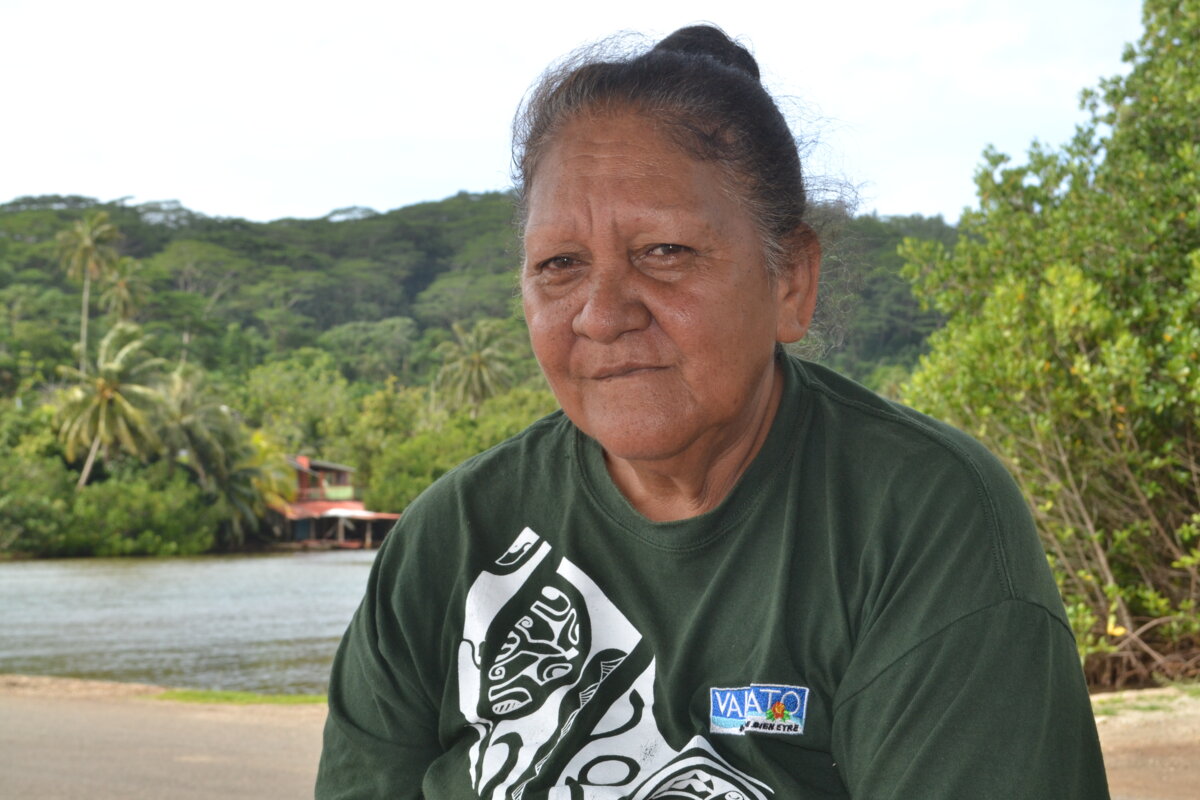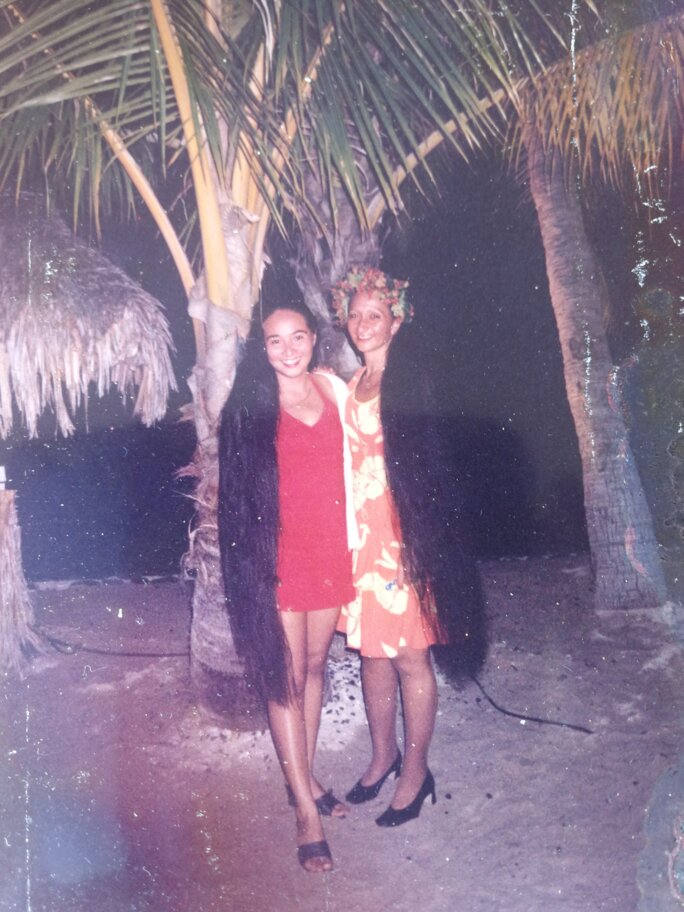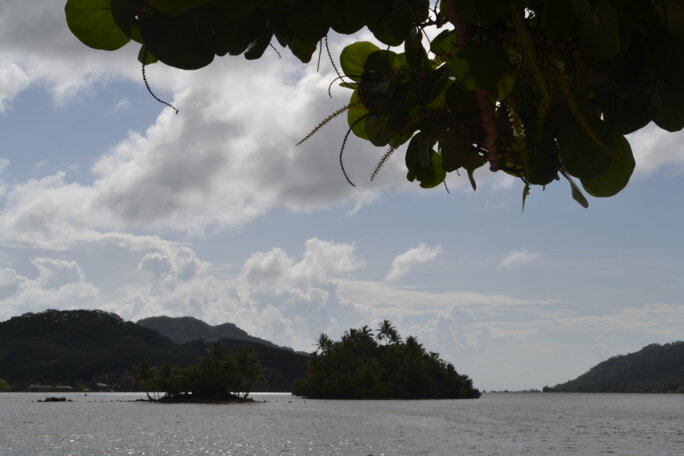Made up of 118 islands and atolls spread over a region of the South Pacific Ocean larger than western Europe, French Polynesia, a semi-autonomous overseas territory of France, was the scene of 193 nuclear bomb tests ordered by Paris between 1966 and 1996, and which were exploded in the atmosphere and underground.
The tests followed 17 others that had been carried out by the French military over and under the Sahara Desert in southern Algeria between February 1960 and February 1966. It was in July 1966 that the testing was moved to French Polynesia, concentrated on the atolls of Mururoa and Fangataufa. Officially, 46 nuclear bombs were exploded in the air above the atolls between July 2nd 1966 and September 14th 1974, after which 147 others were triggered underneath them up until January 1996.
According to French defence ministry documents declassified in 2013, the plutonium fallout from the bombs covered the whole of French Polynesia, when its most populated island, Tahiti, became exposed to radiation levels that were 500 times above what was deemed to be tolerable.
The total of the bomb tests were estimated to be equivalent to “700 times Hiroshima”, according to Polynesian centre-right member of the French parliament Maïna Sage, a longstanding campaigner for compensation to be awarded to victims of the tests. The consequences upon the health of the Polynesian population have long been a subject of bitter controversy, notably over the reluctance of Paris to provide compensation for those who became seriously ill as a result of the nuclear fallout.
It was only in May last year, when the French parliament adopted a reform of the organic law defining the new semi-autonomous status of French Polynesia, that official recognition was given in a formal text for the very first time to the grave human and environmental consequences of the three decades of nuclear bomb tests – 23 years after the last was triggered.
“The [French] Republic recognises the contribution put upon French Polynesia for the construction of the Nation’s nuclear dissuasion capacity and defence,” read a landmark article of the new law, which referred to the “conditions for indemnities of persons suffering from radiation-induced illnesses” and engaged France to assist with “the economic and structural reconversion of French Polynesia consecutive to the cessation of nuclear tests”.
Marguerite Taputu, a retired cook, lives on the island of Taha’a, part of the Leeward Islands chain of French Polynesia, located in the west of the archipelago of the Society islands. “Of France, I only know the hospitals and concrete of Paris,” she told Mediapart in an interview in Taha’a in February this year. “In all, I went three times to Paris, each time for operations, except once for a check-up of the thyroid.”
“I have had three cancers, which is not trivial,” said the mother of four, born in 1955, speaking calmly and in a low-voice, seated at the port, where ferries come and go linking Taha’a with the nearby islands of Raiatea and Bora Bora, a popular tourist resort. “I had cancer of the thyroid, a cancer of the left breast, and cancer of the right breast.” My first cancer was diagnosed in 1993. I was operated in 1994 and I went to Paris in 1995. It was the thyroid. I was given radiotherapy, a scintigraphy and I took iodine. I stayed one month in Paris.”

Enlargement : Illustration 1

The first cancer she was diagnosed with, that of the thyroid, is a typical consequence of being exposed to a strong radioactive source. For someone of her age in French Polynesia, and who has spent all her life between the Austral and Leeward islands, the three decades of French nuclear tests, beginning in 1966, can be regarded as a credible explanation of contamination.
The multiple cancers she has suffered are also typical of exposure to a radioactive cloud, like that she was herself exposed to drifting somewhere between the islands of Rurutu, in the Austral group, and Tahiti, Raiatea and Taha’a in the Society islands. Up until 1974, nuclear test bombs were dropped by planes, triggered on balloons and on top of barges above the waters of the Mururoa and Fangataufa atolls, .
Marguerite spoke of her multiple cancers and stressful treatment with a certain softness of tone, eclipsing the pain of her experience as if it was a fatality. She did however recall the anguish of each diagnostic when, she said, “one realises that it is perhaps the last time, and one thinks of the children”. She says she does not feel ill: “I’m well, my knee hurts me a bit because I have arthritis, but I’ve never made a link between my illnesses and the tests. I never submitted a request for compensation.”
“One day, a health department in Tahiti asked me why I had had a cancer of the thyroid,” she recalled. “I answered that I didn’t know, it arrived like that.”
While Marguerite shows no anger, she said she agreed to be interviewed by Mediapart to “give this story” in the name of her family and their own suffering: “My half-sister had cancer and she’s gone. I don’t know what cancer it was. The youngest of my brothers was on [French nuclear test site atoll] Mururoa, he had thyroid [cancer] too. He is still alive. He is in Tahiti, and his Marquesan [from the Marquesas Islands of French Polynesia] wife has lymphoma. The eldest of my brothers died from lung cancer. Among my children, my eldest girl has developed thyroid cancer. She’s the only one.”
Marguerite, who likes to sing with others in church, said she asks god to giver her strength. “It’s the first time that I recount my story, I talk with friends that’s all,” she concluded. “I don’t have any resentment towards France. I’m Polynesian. For me, having a French [identity] card has always been strange.”
In her wider Teinauri-Taputu-Harea-Patere family clan, members have variously suffered from cancers of the thyroid, breast, lung and liver. Marguerite Taputu’s sister, Rina Henriette Teinauri, died in 2004 from acute leukaemia. Seven years later, her daughter, Béatrice Airuarii Marro, was diagnosed with chronic leukaemia.
It is Béatrice who today is fighting so that her family are not forgotten victims of France’s nuclear weapons programme. “I accuse France, is that grave?” she asked, speaking to Mediapart at her home in Papeete, the capital of French Polynesia situated on the island of Tahiti, surrounded by administrative and medical documents. She has researched a wide family tree that records the illnesses of members that could potentially have been caused by radioactive exposure due to the nuclear tests. She wants to see the cross-generation transmission of the illnesses to be officially recognised.
' I knew that I would not have another child'
Béatrice, unlike her aunt Marguerite, is instilled with anger. “I was pregnant with our son, Jean-Baptiste, when I learnt that I had leukaemia like our mother,” she said. “I accuse France of neglecting its responsibilities, namely the rational, efficient and just treatment of my requests for indemnity, for recognition.”
In the case of her late mother Rina Teinauri, the French public body responsible for deciding compensation awards, the Committee for Compensation of Victims of Nuclear Tests (CIVEN), finally in 2019 declared her to be a “victim” of the nuclear tests in Polynesia. That decision gives her heirs the right to seek financial compensation for her loss.
But Béatrice has never obtained recognition that her own leukaemia was either the result of direct exposure to the radioactive fallout from the nuclear tests, or that, as she believes, it was transmitted in the womb by her mother. The CIVEN has rejected her case outright, and it was again thrown out on her appeal before the Council of State, France’s supreme court for administrative justice.

Enlargement : Illustration 2

“I learnt that I had chronic myeloid leukaemia when having routine tests for my pregnancy,” she said. “When I learnt that, I thought of our mum. I said to myself, ‘Leukaemia, our mum had that and now it’s me, how come?’.”
Leukaemia is a group of different cancers of the blood cells which most often begin in bone marrow. The type of leukaemia that Béatrice suffers from requires lifelong medical treatment. She has also in parallel developed other illnesses due to both the treatment she receives and her weakened physical condition, which have affected her heart and her lungs.
She recalled the trauma of her pregnancy: “My doctor said to me, ‘It’s serious, your pregnant’. He wanted me to have an abortion, but I refused. I was looked after at the Saint-Antoine hospital in Paris. That’s where I married and I asked the Lord to bring me back alive to our fenua [the Polynesian for ‘homeland’]. There was a constant balance and choices to be made between preserving the life of my child to be and to save mine in a manner that was certain. I already knew that I would not have another child. That’s now out of the question. You cannot become pregnant again when you are taking very toxic medicines for life, and above all when you are afraid that your descendants would also have cancer.”
As she sifted through her red, green and blue files filled with documents with which she has built her claims for compensation, and with a hard and concentrated look, she explained that her fight was not just about her own suffering, nor solely that of her mother or of the wider Tenauri-Taputu-Harea-Patere family, but also for that of her compatriots. “I am fighting for my people, for the Polynesian people,” she insisted. “I want people to understand that to go to France to be treated is a terrible ordeal. If the Popaa [Polynesian for ‘the French’] had to come here to be looked after, who would come and see them? Who would have the money to do so? You leave everything. After the illness is announced, the shock is brutal. When you are told you have cancer, one doesn’t laugh, one’s knocked to the ground. My mother was 45-years-old when she was diagnosed, I was 35 when I was pregnant. I am afraid for [my son] Jean-Baptiste, I am very afraid.”
No reliable records kept of cancer cases
Like Béatrice Airuarii Marro, many among French Polynesia’s population of around 276,000 fear the health consequences of the nuclear tests on future generations. It is a fear made all the more acute by the fact that the French authorities, after decades of denial over the consequences of the fallout from the 193 nuclear bomb tests, have now timidly recognised the “contribution put upon French Polynesia” from “radiation-induced illnesses”.
But they, along with the French armed forces and even French Polynesia’s local government, dismiss the suggestion that exposure to the fallout may have caused genetic mutations that have been passed on to offspring. In unattributable, off-the-record conversations, officials from local government readily talk of a “psychosis” over the dangers of irradiation.
“Our greatest fear is the transmission by genetic mutation of illnesses caused by irradiation,” said Father Auguste Uebe-Carlson, a priest and president of the Association 193, one of three groups in Polynesia representing victims of the French nuclear tests. “We are a small population that is visibly being driven to becoming more and more ill, and so destined to disappear. No studies have been launched on the subject. For us, that’s staggering, and even criminal. We have asked for the figures on the 23 illnesses recognised by France to being caused by irradiation, and the seven others recognised by the United States. The CPS, equivalent to the Social Security [administration] in France, gave us figures only up to 1992 – more than 20,000 people developed one of these illnesses. That’s enormous.”

Enlargement : Illustration 3

Amid the secrecy that so regularly surrounds issues that involve nuclear power and armaments, the scientific data relating to the consequences of nuclear testing in French Polynesia is the subject of controversy, with conflicting standpoints that pit the victims’ associations and whistelblowers against the authorities. An illustration of this was a medical study published two years ago, and which caused a stir of doubt even among the most ardent of those who defend the tests as being largely of little consequence on the health of the local population.
The study, first revealed by French daily Le Parisien, was by Dr. Christian Sueur, who was between 2012-2017 head of the child psychiatry department of French Polynesia’s main hospital services in Tahiti. Entitled “The genetic consequences French nuclear tests in the Pacific for grandchildren (2nd generation) of veterans of the CEP and inhabitants of Tuamotu Gambier” (available, in French, here), it was published in January 2018. The “CEP” referred to in its title is the acronym for Centre d’expérimentation du Pacifique (the name for nuclear test sites in French Polynesia), while Tuamotu-Gambier are islands of the eastern Tuamotu archipelago. It reported an abnormally high number of behavioural problems and irradiation-induced illnesses among the populations that had been the most directly exposed to the fallout of the nuclear tests. Among a number of other anomalies, it found that, in 2016, one out of every four children living on the Tureia atoll, which neighbours that of Moruroa where the tests were mostly centred, suffered from thyroid cancer.
Despite this documented and thorough research, it was largely dismissed by the head of the French Polynesian government’s department in charge of monitoring the effects of the nuclear tests, Yolande Vernaudon. “The Sueur report is a report of opinion,” she said. “It is not a scientific report because there was no reading panel. That does not signify that there is no trans-generational [transmission of illnesses caused by irradiation], but rather that nothing is proven. Studies must be continued.”
But that appears unlikely given the absence of any political will to do so. Mediapart has gained access to a confidential document for internal use within the administration of the local government of French Polynesia, dated February 2020, and which noted that the “register” of records on cancer cases in the local population was “the object of numerous criticisms and remains in question”.
The register, which was only created in 1985, does not operate along the same guidelines as similar records in mainland France. The document reveals that epidemiology experts consulted by the local government warned that the register “does not constitute an exhaustive, reliable and long-term inventory of the number of cases of cancer among residents”. The document also underlined that “French Polynesia is the only [French] overseas territory which does not have a qualified register of cancer cases, with the exception of Mayotte”. Similarly, there is no register which records cases of physical malformations.
As a result, there can only be doubts regarding the reassuring public claims of the local administration, such as one published in a separate document which insisted that, in French Polynesia, “the rates of prevalence of cancers are no more alarming than [those] in France or in other regions of the Pacific”.
The tardy creation of an official “cancer institute” is in the pipeline. But because local healthcare management is one of the sectors to which the semi-autonomous government has control over, there are fears voiced by some that it will not be given the proper means to tackle the vast task of digging for the truth about the consequences of the nuclear tests.
Amid this absence of proper epidemiological research and monitoring, and the prevailing lack of political will to investigate the evidence of the consequences of the tests on the local population, families such as the Tenauri-Taputu-Harea-Patere feel they can only count upon themselves to fight for the truth about the dangers for future generations.
Meanwhile, during her interview with Mediapart on Taha’a, Marguerite Taputu was getting ready for corrective surgery upon her right breast at the central hospital in the capital Papeete, which involves travelling by ferry and then by plane. “The prothesis needs to be changed, it’s no good,” she explained.
-------------------------
If you have information of public interest you would like to pass on to Mediapart for investigation you can contact us at this email address: enquete@mediapart.fr. If you wish to send us documents for our scrutiny via our highly secure platform please go to https://www.frenchleaks.fr/ which is presented in both English and French.
-------------------------
- The original French version of this report, the first of a series of four on the consequences of the French nuclear tests in French Polynesia, can be found here.
English version by Graham Tearse


